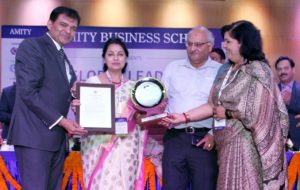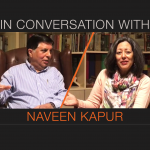“Every problem has a solution.” – Meenakshi’s father taught her when she was a child and and just like that – it became a belief. And it was this belief that has made her the leader that she is today. Her work in the Human Resources department of the organizations she’s worked with, proves that with positivity and solution focus, like Meenakshi, you can be a real game changer!
By developing policies that protect the interests of all employees, specially women employees with families, young children and senior parents – Meenakshi has proved that she cares! Her innovative solutions to personal issues that the female workforce faces in a country like India, has improved the public sector for women substantially.

The HR department is usually seen as the ‘mean voice’ of the organisation – since they are responsible for hiring, firing, salary deduction etc. But for Meenakshi, it means she has the responsibility to protect the well-being of the employees while making sure their productivity doesn’t get impacted, their morale doesn’t go down and they don’t lose on wages and perks. The pivotal cog of an organization – the link of the top management to its employees – the HR department recognizes and addresses the people’s
needs. These needs were recognized by Meenakshi when she joined her current organization three years ago. And all the changes she has since introduced say “I care about my workforce” loud and clear!
Meenakshi introduced flexibility in the otherwise stringent work hours of the public sector. Breaking the stereotype of a fixed 9 to 5, this flexibility allows employees to come in a little late if they can work till later than 5:30 pm to make up the hours, or a little early in case they need to leave before 5:30. She tells us how a small change like this made commuting so much easier and less stressful for employees who would be stuck in rush hour traffic for hours!

Going a step ahead of the maternity and paternity leaves for expecting parents, Meenakshi brought in a different variable that allows employees to take “2-hour leaves”. Imagine being able to attend your child’s PTA in the morning and go to work without losing a half-day’s pay! This is a unique initiative which not only allows flexibility of time but also helps people achieve a work-life balance, where they no longer have to overlook their family commitments. And guess what? Employees who feel valued are productive employees!
Beyond the provisions for leaves and flexibility, Meenakshi has come up with great ideas to make the office more comfortable for and considerate of female employees. Her organization provides reserved parking spots which are closer to the elevators or entrances for expecting mothers– an idea like this is not only safer for pregnancies in the third trimester, but also makes the women feel cared for, heard, understood, and overall, respected. She has also introduced sessions on health, financial planning, and legal rights for empowering the women in her care to take well-informed decisions on their own.
These small steps go a long, long way. A little empathy, and a little understanding is all it takes to create a strong bond of trust between the employees and the organization. Like she says,
I want to make the experience of working here from ‘cradle to coffin’. Your first job and you stay on till you retire.
With the likes of Google and Facebook entering the Indian Market in the early 2000s, a lot of Indian companies have had to change their approach towards employees – now, often referred to as the ‘work family’. Their policies support major life events in the life of an employee – friendly policies supporting new parents, care for senior parents, higher education needs for employee, freedom to innovate and flexible work arrangements. Going forward, the trend is bent towards employee experience and keeping them happy. Studies show that the happiness quotient of your workforce dictates their productivity. Not only women but men too benefit from these policies, as they find themselves able to provide for their families in more ways than just monetarily.
The Human Resource department is often looked at with fear and distrust. But here stands a woman who cares for ‘her people’ and they respond to her in the same way. She is able to break union strikes because she cares. She is the first woman full-time director of a Central Public Sector enterprise (under the Ministry of Power) because she cares and over the course of her career, it has shown.
Meenakshi concludes by telling us the secret behind great achievements – “You can’t be a superwoman. Know your priorities and master the art of delegation.”





